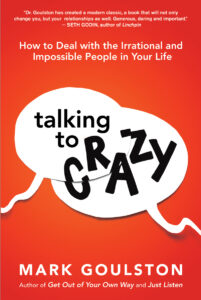You’re CRAZY!
Have a manipulating boss driving you nuts?
Is a co-worker bullying you?
Do you have someone irrational or deceitful in your life?
You’ve tried explaining, tried rationalizing, tried…everything…and still, you get nowhere.
What do you do when you are talking to CRAZY?
Enter acclaimed psychiatrist Mark Goulston with the answers. Mark’s new book Talking to Crazy: How to Deal with the Irrational and Impossible People In Your Life is a guidebook to dealing with the impossible people that cross your path. His suggestions can be put to work immediately. I know because I did. And they work.
Recently, I asked Dr. Goulston about his exceptional new book and his practical observations and suggestions in dealing with difficult people.
We Are All A Little Nuts
When a psychiatrist says “We’re all at least a little nuts,” it gets my attention. How are we all a bit crazy? What’s the best way for us to identify our major issues and weaknesses?
We’re all a bit crazy because we all engage at times in non-rational, non-functional self-preservation (a.k.a. our identity). That means that when the reality of what we are dealing with changes, we will often continue to “do the same things over and over, expecting different results.” The reason for that is because in an increasingly specialized world, the areas in which we feel competent, confident and in control are increasingly narrow. That translates into trying to stay inside those areas rather than adapting to the new situation facing us. By the way, I don’t see “crazy” people as mentally ill. I have great compassion for and spent 30+ years treating people with significant mental illness, because they truly cannot stop acting the way they do until that mental illness – depression, anxiety, bipolar disorder, ADHD, schizophrenia, etc. – is treated. To me crazy people are people who can control their behavior, but choose not to. In essence they abuse or take advantage of their relationships. They drive us crazy vs. being truly mentally ill.
I was incredibly moved by Mr. Harding’s story during your residency. What did this teach you?
It taught me not to jump to conclusions or be overly influenced by others before I gather all the information I can from the other person. That means patiently taking the time to truly understand and go to “their there” before I try to fit them into “my here.”
Lean Into Crazy
What does it mean to “lean into” a person’s crazy?
It means to listen to and into them without a personal agenda. Wilfred Bion referred to this as “listening without memory or desire,” because when you listen with memory, you have a past personal agenda and when you listen with desire, you have present or future personal agendas that you are trying to foist onto the other person. In neither case are you listening to them. Leaning into the other person and understanding them from their point of view also causes their (and your) cortisol to lower and oxytocin to increase. Cortisol is associated with stress and when instead of leaning into another person, the situation escalates, cortisol and stress in both of you go up. Oxytocin is associated with connecting and bonding with another person and causes people to feel safer, lower their guard and be willing to lean back into what you’re saying after you’ve leaned into them.
Reframe an Attack as an Opportunity
You have so many suggestions in this book that are immediately actionable. “Reframing an attack as an opportunity” or using an attack as an “opportunity for poise.” I loved this idea. Would you share more about this technique?
Most of us admire and want to be more like people who have poise, especially poise under pressure. Since there seems to be less and less of it in the world, the more you have and demonstrate it, the more others will respect you and want respect from you and the more you will differentiate yourselves from your peers. Your only opportunity to develop poise is when you are under pressure. If you agree with that, then reframing stress, mistakes and doing damage control are among your best poise-increasing chances. To help you do it in the heat of battle, there are multiple techniques including the following: a) talking yourself down from “Oh f%&# to OK,” taking deep breaths between the steps; b) imagining having a conversation with living or deceased mentors who cared about and believed in you and who you allowed to talk you out of doing something foolish because of how much they mattered to you.
How to Deal with Venting
When a person is venting, you say to think of a soda that fizzes a little on a normal day but explodes when it is shaken up. You say to try something like this: “I can see you’re really angry at me. Tell me: Do you hate me or are you just incredibly disappointed in me for doing X (or failing to do X)?” Why does this work so well?
When you give people the correct words for what they are feeling (called affect labeling), it lessens their amygdala activation by 33%. The amygdala is like the emotional point guard in your brain. When it becomes over-activated it “hijacks” you away from being able to use your rational brain to evaluate the situation you’re dealing with. When you lessen amygdala activation, people are better able to tap into the rational part of the brain. Offering people such words as “angry” and “disappointed” to either use or identify with helps accomplish this. Also affect labeling lessens cortisol and increases oxytocin and those also help in calming someone (and yourself) down.
Let’s look at another technique, the “What’s the worst thing for you?” When does this one come into play?
When people are wanting and needing to get something off their chest in order to come back to their senses, prematurely giving them advice or solutions, such as, “You need to calm down!” or, “You’re getting too emotional!” may get them to shut up with you, but it often builds up their frustration inside. That increases the likelihood that they will go and take it out on someone else. Even though this is not surprising, these are the most common responses they receive. When instead you ask them, “What’s the worst thing for you?” you tell them that you’re not getting upset with them, you’re understanding them, and you’re even inviting them to get more of their frustration out. If you can then allow them to do it, and not take their outburst personally, you will notice them calming down in front of your eyes (or ears on the phone or even in their text messages signing off with emoticons).
Dealing with the Toxic Deflector
What is a “toxic deflector?” How do you identify and deal with this type of crazy?
In the context of the book a “toxic deflector” refers to people who manage up superbly, take credit they don’t deserve and have a way of even making others look bad compared to them. In psychological terms they are what is referred to as “splitters.” That means they will find a way to endear themselves to someone by making themselves look good and someone else look bad. They are often motivated by the fear of being found out as not being competent, and they try to keep people above them from discovering that by playing up to them at others’ expense. One of my favorite quotes about them is: “People who can’t take advantage of opportunity, find a way to take advantage of people.” To deal with and disarm them, find something they are competent at (there is usually something), help them use it to get real credit for something they actually do and then find a way to compliment them to their boss. If they question why you’re doing that (since it is the exact opposite of what they’d do) say to them, “I was getting tired of feeling frustrated and upset with you, because I don’t like being that way. So I decided to see about helping you be more successful, which feels much better to me.”
When to Know if Someone Needs More
How do you know if someone seriously needs some help and it is “above your pay grade?” What resources do you recommend?
 “Above your pay grade” means dealing with someone with a significant mental problem or mental illness that they are truly helpless to get past without professional help. Professionals can often recognize them sooner. Non-professionals recognize them after a period of time in dealing with them and realizing that there is something more serious going on as indicated by their actions, their continuous irrational thinking and their being completely resistant, overly defensive or argumentative with any help you offer.
“Above your pay grade” means dealing with someone with a significant mental problem or mental illness that they are truly helpless to get past without professional help. Professionals can often recognize them sooner. Non-professionals recognize them after a period of time in dealing with them and realizing that there is something more serious going on as indicated by their actions, their continuous irrational thinking and their being completely resistant, overly defensive or argumentative with any help you offer.
In the book I make the following distinctions regarding professional help. Psychiatrists can help patients psychologically but increasingly are focused on stabilizing their patients’ neurobiology. Psychologists and therapists help patients stabilize their thinking to cause them to be less reactive and impetuous and more thoughtful in how they react to situations in their lives. Counselors offer patients advice and suggestions and steps to take charge of their lives. Coaches give patients and clients advice about how to set goals and stay committed to the steps in achieving them. Psychosocial rehabilitation provided by such organizations as the Life Adjustment Team in Culver City, CA has mental health trained professionals literally go to where their clients exist in their lives and, by taking them through a process of teaching, mentoring and coaching in real time, get people who usually fall through the cracks back on track in their lives and stay on track.
Talking to Crazy: How to Deal with the Irrational and Impossible People In Your Life

